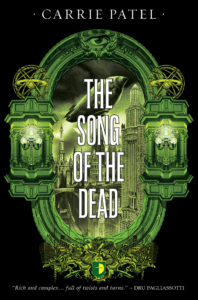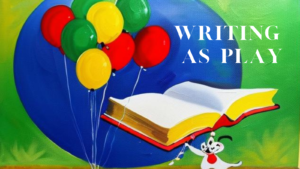Last week, Argentina’s largest literary prize, sponsored by the government through the National Arts Fund, announced that it would only accept science fiction, fantasy and horror entries this year.
All hell broke loose immediately. In some cases, there were people outside of those genres who’d been working on their manuscripts assuming it would be a non-specific contest the way it always has been. I can see how those individuals might have been miffed.
But in other cases, the pushback owed more to the fact that the SFF genre is seen by many as less than literary in scope and ambition.
As an Argentine writer who spent his childhood outside the country and who currently writes for the English-language market exclusively, I find this last attitude surprising.
Why? Because, although Argentina doesn’t have a long-standing horror tradition, the science fiction and fantasy genres have traditionally been extremely literary and socially critical.
Argentina doesn’t have, in the gestation period of the genre, an equivalent to the Pulp Era in which different kinds of fiction were massively marketed to different kinds of readers. While that lack did somewhat stunt the growth of the SFF genre in popular terms, it allowed writers to feed the tools of different genres into literary fiction without having to worry about any associated stigma.
Jorge Luis Borges, of course, is the first name one thinks of when discussing Argentine science fiction, but he was just the tip of an iceberg that included not only a tradition in Argentina but also around Latin America (writers such as Gabriel GarcÃa Márquez and, to a lesser extent, Mario Vargas Llosa were using these tools as well).
Of course, it would be disingenuous to say that this wasn’t also happening in the English-language genre. It was. But perhaps the main difference is that in Argentina, no one was too concerned about classifying things as science fiction and fantasy. They were just books, written by better or worse writers, and only in the 1970s was the genre separated in any real sense””and that was only by taking the obvious spaceship tales and dragon stories out of the “literary” category. Magic realism was still perfectly literary, and no one would ever have dreamed of reclassifying it.
All of which was quite bewildering to me at first. I was brought up on the genre classifications of the English-language world in the 1980s. Since I was strictly a reader back then, not a student of the genre, my view of what was and wasn’t SFF was formed by what popped up on which shelf in the Walden Books near my house.
So when I moved back to Argentina, I found it a bit bewildering. Suddenly, SFF wasn’t meant to entertain people, but mainly to criticize society and expand philosophical discussions. It really wasn’t what I expected of the genre, and I found Argentine SFF difficult to read and much too politically engaged for my liking.
To this day, I still prefer genre work in which the story and characters take precedence over politics and philosophy, and I’ve been told my writing reflects this (in rejection letters as well as in reviews!), but I’ve made my peace with the fact that the genre in Argentina has different roots and that I’ll never find a plot- or science-driven novel on the shelves here.
Along with this realization, I’ve come to understand that most of my own work wouldn’t be aligned with the national taste either. While the market for a more traditional style of SFF still exists in the English-language world, especially among readers who grew up reading the Golden Age greats and their descendants, it has never truly existed in Argentina.
But those who enjoy China Miéville””hailed as quite possibly the greatest genre writer of this generation down here””will find Argentine SFF very much to their liking”¦ if you can read Spanish (I’d be delighted to point anyone interested in the right direction, just drop me a line).
 BIO:Â Gustavo Bondoni is an Argentine writer with over three hundred stories published in fifteen countries, in seven languages. His latest novel is Jungle Lab Terror (2020). He has also published another monster book Ice Station: Death (2019), three science fiction novels: Incursion (2017), Outside (2017) and Siege (2016) and an ebook novella entitled Branch. His short fiction is collected in Pale Reflection (2020), Off the Beaten Path (2019) Tenth Orbit and Other Faraway Places (2010) and Virtuoso and Other Stories (2011).
BIO:Â Gustavo Bondoni is an Argentine writer with over three hundred stories published in fifteen countries, in seven languages. His latest novel is Jungle Lab Terror (2020). He has also published another monster book Ice Station: Death (2019), three science fiction novels: Incursion (2017), Outside (2017) and Siege (2016) and an ebook novella entitled Branch. His short fiction is collected in Pale Reflection (2020), Off the Beaten Path (2019) Tenth Orbit and Other Faraway Places (2010) and Virtuoso and Other Stories (2011).
In 2019, Gustavo was awarded second place in the Jim Baen Memorial Contest and in 2018 he received a Judges Commendation (and second place) in The James White Award. Â He was also a 2019 finalist in the Writers of the Future Contest.
His website is at www.gustavobondoni.com.
If you’re an author or other fantasy and science fiction creative, and want to do a guest blog post, please check out the guest blog post guidelines. Or if you’re looking for community from other F&SF writers, sign up for the Rambo Academy for Wayward Writers Critclub!





 Growing up, two of my favorite things were books and video games. If you’d told me twenty years ago that I’d grow up to write both, I probably would have choked on my Mountain Dew.
Growing up, two of my favorite things were books and video games. If you’d told me twenty years ago that I’d grow up to write both, I probably would have choked on my Mountain Dew.
 I admit to being a sucker for the Ticky Box. Which is to say, I am perhaps excessively motivated by having Lists and Ticking Things Off Them. I like setting goals for myself, and I’m good at breaking those goals down into smaller steps, rewarding myself for them, all that sort of self-management stuff. I’m keen to write, to write more, to write better; so I use my goals to manage all those things. And as far as it goes (and for as long as it works), that’s great.
I admit to being a sucker for the Ticky Box. Which is to say, I am perhaps excessively motivated by having Lists and Ticking Things Off Them. I like setting goals for myself, and I’m good at breaking those goals down into smaller steps, rewarding myself for them, all that sort of self-management stuff. I’m keen to write, to write more, to write better; so I use my goals to manage all those things. And as far as it goes (and for as long as it works), that’s great.


